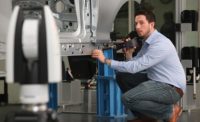
Laser tracker systems are equipped with some method for measuring the ambient temperature and air pressure. Slow changes in the temperature and pressure are typically measured and compensated for automatically. Sudden changes in temperature are usually noticed by an operator because they can be felt. But sudden changes in ambient atmospheric pressure are often unnoticed by an operator, yet can have as dramatic an effect on measurement accuracy as sudden temperature changes.
In an open building, air pressure will change no more quickly than the outside weather changes. But in a closed building there are sometimes areas with “artificial” atmospheric pressures. Clean-rooms usually maintain a “positive pressure” so that when a door is opened, air will flow out of, rather than into the room, preventing dust and other contaminants from entering the area. Composite shops and paint shops frequently maintain a “negative pressure” so that when a door is opened, vapors and fumes will remain inside the room. Any place that is well sealed has the potential of having an artificial atmospheric pressure. If the air-conditioning system is out-of-balance between the return-air and the blower, an artificial pressure environment is possible. When opening a door, if you hear a little “hiss,” then there is probably artificial pressure. Many metrology labs can have artificial positive pressure during the summer months, because labs are often built in the middle of the plant and the air-conditioning system works hard to cool the room.
The problem is not the artificial pressure, but rather the instant change in air pressure when a door opens. The change in pressure and the change in the index of refraction are instantaneous. If measurements are being taken with the tracker at that moment, they will be significantly affected.
There is no perfect solution to this problem. A skilled operator must be aware of the potential problem and work to prevent his measurements from containing errors that are caused by sudden changes in atmospheric pressure. Measuring a point again if sudden pressure changes are noted is a good practice.
By Kevin Barron
Leica Geosystems (Metrology Division)



